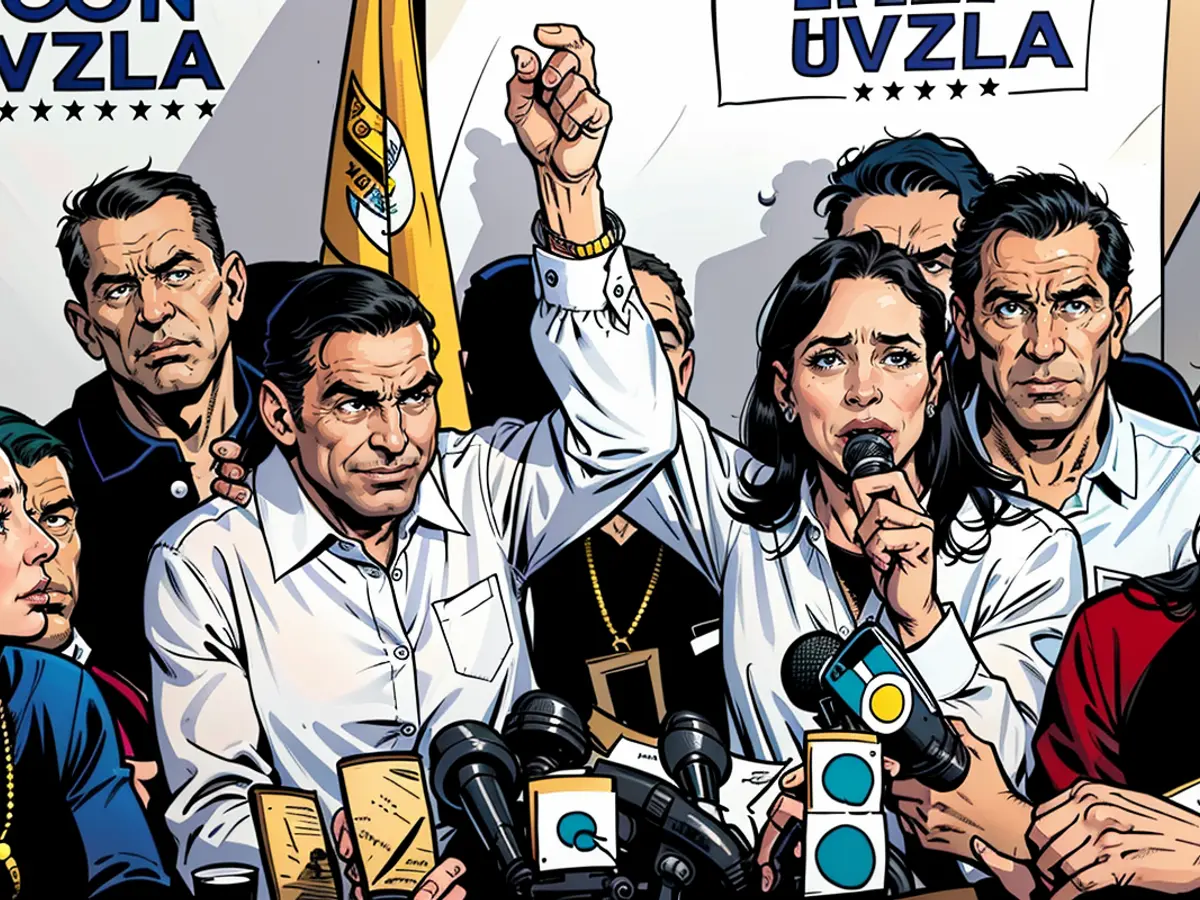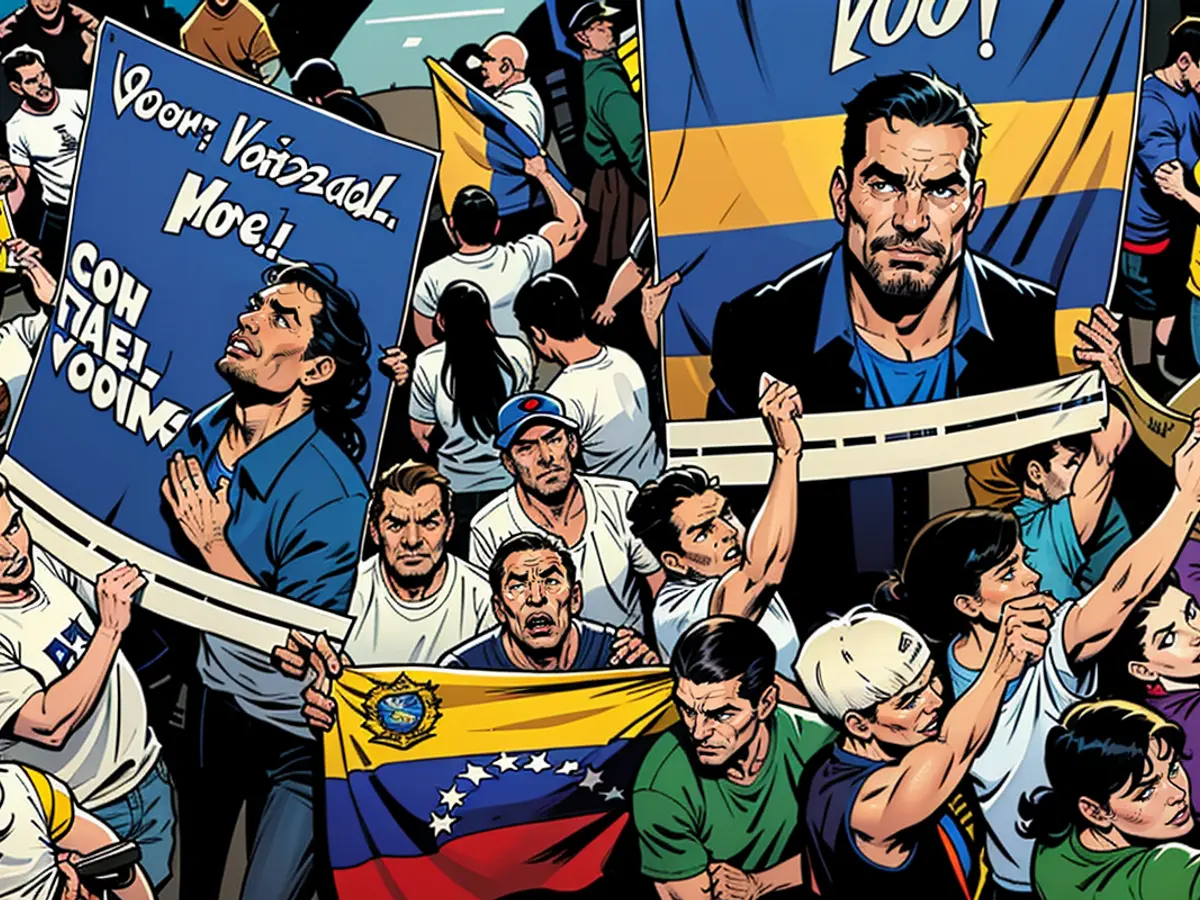Maduro declares victory - Opposition raises doubts
The electoral authority declares Nicolás Maduro as the winner of the Venezuelan presidency elections, securing approximately 51.2% of the votes. The opposition reports irregularities and questions the official result.
After the announcement of Nicolás Maduro's victory in the Venezuelan presidency elections by the National Electoral Council, the opposition also claimed victory. Previously, they reported irregularities during the voting process. The camp of opposition candidate Edmundo González had predicted a victory for their candidate over Maduro earlier in the evening. Venezuela has a new president, and his name is Edmundo González, said opposition politician María Corina Machado.
The United States have expressed doubts about the victory of incumbent Nicolás Maduro in the Venezuelan presidency elections announced by the National Electoral Council. Washington has "serious concerns" that the reported result does not reflect the will of the people, said Secretary of State Antony Blinken. Previously, the chairman of the Venezuelan Electoral Council, Elvis Amoroso, announced that Maduro had secured approximately 51% of the votes and had relegated opposition candidate Edmundo González to the second place. The result is "unalterable," added Electoral Council head Amoroso.
Several surveys had predicted a victory for opposition candidate González. However, observers did not expect a free and fair election. Most recently, numerous opposition figures were arrested, and government-critical candidates were not allowed to run for office.
The NGO Foro Penal reported over 300 political prisoners. Popular opposition leader María Corina Machado was banned from holding public office for 15 years due to alleged irregularities during her tenure as a deputy. In her place, the previously largely unknown González ran for president.
If the announced result holds, Maduro can begin his third six-year term in January 2025. According to observers, the chances of a political change in Caracas were almost non-existent based on previous assessments. In contrast to the elections six years ago, the opposition showed unity this time. Moreover, even longtime supporters of the socialist regime were disillusioned due to the catastrophic economic situation.
One quarter of the population has left the country
Over 80% of the population live in the once wealthy country with large oil reserves below the poverty line. Power outages occur frequently. Gas, medication, and gasoline are scarce. More than seven million people - one quarter of the population - have left Venezuela in the past ten years due to poverty and violence.
Maduro recently warned of chaos if the opposition won. He threatened a bloodbath and a civil war in Venezuela if he was not re-elected in the election. After casting his vote, he stated that his re-election was "the only option for peace." Maduro described the Venezuelan electoral system numerous times as "the most reliable, transparent, and secure electoral system in the world."

EU was not allowed to send observers
The European Union was not allowed to send observers to the Venezuelan elections. European Parliament President Roberta Metsola criticized the exclusion of international observers and called for the "immediate release of all political prisoners and the respect for the fundamental rights of the Venezuelan people." The EU had previously threatened to impose sanctions if the elections were not free and fair. However, the Venezuelan government did not allow the EU to send observers, citing COVID-19 restrictions.
The EU was not represented at the voting with observers, as Venezuela's electoral council revoked an invitation to them due to existing personal sanctions against National Electoral Council representatives. According to Panamanian authorities, four former presidents were prevented from traveling to observe the elections on Friday. The United Nations did send some election experts, but their roles are limited as the body does not issue public statements on the evaluation of the voting process.
During the presidential election, there were occasional incidents. Observers and the opposition reported numerous irregularities and intimidation attempts during the vote counting by the electoral council.
In the capital Caracas, there were physical altercations between supporters of the ruling party and the opposition near a polling station. In several states, armed pro-government motorcycle groups, known as "Colectivos," were reported.
Despite these incidents, the election, according to General Prosecutor Tarek Saab, went mostly peacefully. The voter turnout, according to the largest polling station in Caracas, was around 50%. The opposition had predicted a similar turnout of approximately 55% nationwide.
The opposition, led by Gonzalez, had previously warned of possible irregularities and urged their observers to remain at the polling stations until the end of the vote counting. The main opposition observer, Delsa Solorzano, was, however, prevented from entering the electoral council building.
Despite the opposition's claims of irregularities during the Venezuelan presidency elections, Nicolás Maduro was officially declared the winner, securing a significant majority of the votes. The European Union, expressing concerns about the exclusion of international observers, criticized the reported result and called for the release of political prisoners.









